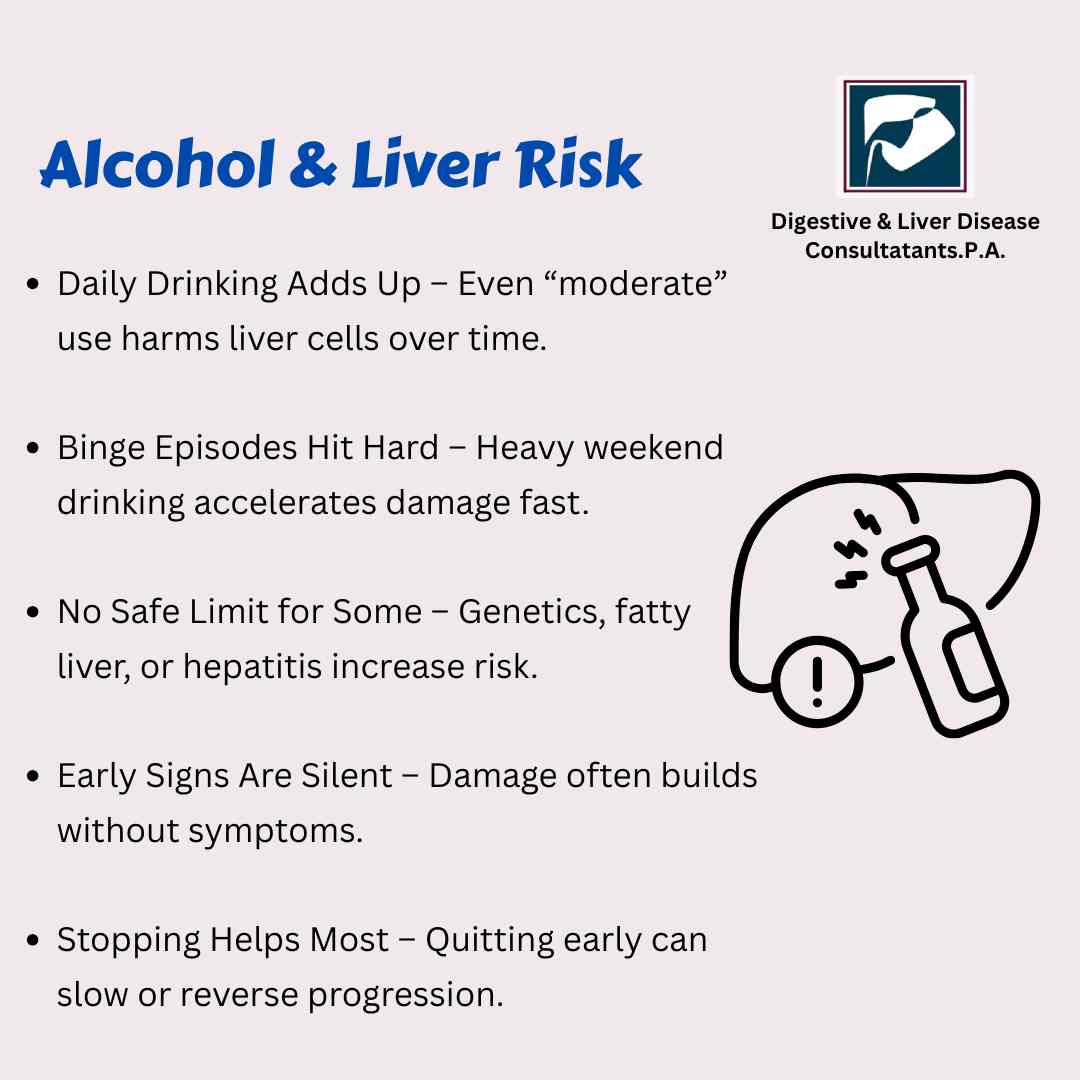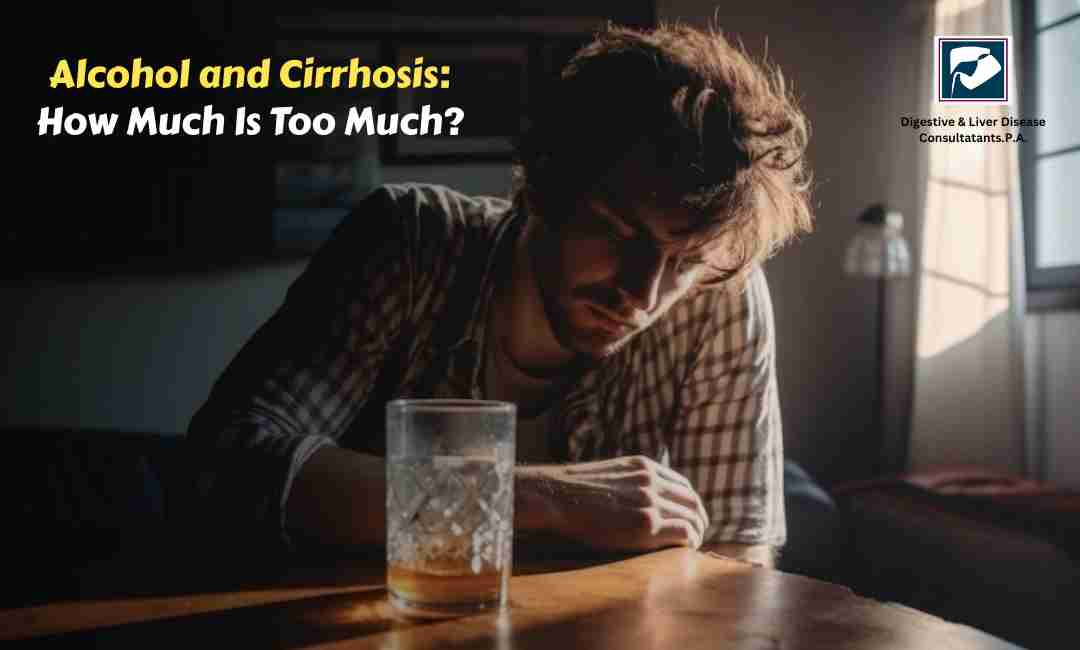Most people know alcohol can hurt the liver, but the line between casual drinking and dangerous drinking often feels confusing. One person says a few beers are fine. Another says no amount is safe. What this really means is that your liver works incredibly hard for you every single day, and alcohol forces it to work overtime. If that workload gets too heavy for too long, cirrhosis enters the picture.
Cirrhosis is when healthy liver tissue slowly turns into scar tissue. Once that happens, the liver struggles to do basic jobs like filtering toxins, processing nutrients, producing important proteins, and supporting digestion. And here’s the thing. Cirrhosis does not appear suddenly. It builds over years of irritation, inflammation, and damage, mostly triggered by long term heavy alcohol use.
How Alcohol Damages the Liver?
Whenever you drink, the liver gets the first hit. It breaks down alcohol so it doesn’t stay in the bloodstream. While doing this, it produces substances that inflame liver cells. A little bit of alcohol once in a while is something the liver can handle, but repeated exposure makes inflammation a daily challenge.
Over time, this leads to:
Fat accumulation
The earliest stage. Liver cells start storing fat because they can’t process alcohol quickly enough.
Alcoholic hepatitis
Inflammation increases. You may feel tired, nauseous, or lose appetite. Some people notice jaundice or abdominal pain.
Cirrhosis
Scar tissue replaces healthy cells. At this point, the damage becomes hard to reverse.

How Much Alcohol Is Too Much?
Here’s the tough part. No two people process alcohol the same way. Genetics, body weight, gender, diet, medications, and underlying conditions all play a role. Still, health experts offer clear guidelines to help you understand your risk.
- 12 oz beer
- 5 oz wine
- 1.5 oz of spirits or hard liquor
For most adults:
Men: More than 14 drinks per week or more than 4 drinks in one sitting increases risk.
Women: More than 7 drinks per week or more than 3 drinks in one sitting increases risk.
Women are more sensitive to alcohol than men because of differences in body composition and metabolism.
But here’s the important truth. Even drinking within these limits does not guarantee safety. If your liver is already stressed, if you have diabetes, obesity, or viral hepatitis, or if drinking runs in your family, the risk rises faster.
Early Warning Signs You Should Never Ignore
Cirrhosis hides quietly in the early stages. Symptoms usually appear only when damage is more advanced. Watch for:
- Constant fatigue
- Loss of appetite
- Easy bruising
- Yellowing of eyes or skin
- Swollen legs or abdomen
- Nausea or vomiting
- Confusion or difficulty concentrating
If you notice any of these, speak with a hepatologist or gastroenterologist without delay. With early care, the liver can heal and prevent further scarring.
Can the Liver Recover from Alcohol Damage?
The good news is that the liver is one of the strongest organs in the body. Stop drinking early enough, and the liver often repairs itself. Fatty liver can return to normal within weeks. Inflammation can settle down with proper treatment and lifestyle changes.
Cirrhosis, however, is more complicated. Once scar tissue forms, it’s difficult to reverse. But you can still prevent further damage by stopping alcohol completely and getting the right medical care.
Think of liver healing like patching a wall. Small cracks can be fixed. Once chunks of the wall turn into hard, permanent scar tissue, the structure weakens. The goal is to catch the cracks early.
How to Protect Your Liver If You Drink Alcohol
Here are practical steps that help lower the risk:
Know your limits
Stick to the recommended guidelines or less.
Give your liver rest days
Your liver needs alcohol free days every week.
Eat liver friendly foods
Fresh fruits, vegetables, lean proteins, and plenty of water support liver repair.
Avoid mixing alcohol with medications
Painkillers, sleeping pills, and anxiety medications can worsen liver stress.
Check your vitamin levels
Alcohol can drain nutrients like Vitamin B, folate, and magnesium.
Regular liver tests
Blood tests, ultrasound, and FibroScan help track liver health.
When You Should Stop Drinking Completely
Some people should avoid alcohol entirely. This includes anyone who has:
- Fatty liver disease
- Hepatitis B or C
- Cirrhosis or fibrosis
- A history of alcoholism
- Autoimmune liver problems
- Severe diabetes or obesity
- A family history of liver disease
If you fall into any of these categories, even occasional drinking can be harmful.
How Digestive & Liver Disease Consultants, P.A. Can Help?
Digestive & Liver Disease Consultants, P.A. is one of the leading centers for liver and digestive care in the region. Patients come here because they want expert care that is thorough, compassionate, and backed by years of specialized experience.
Their team includes highly trained gastroenterologists and hepatologists who manage everything from fatty liver disease and alcoholic hepatitis to advanced cirrhosis. They offer modern diagnostic tools, personalized treatment plans, nutrition guidance, and long term follow up to help patients stay healthy and informed.
If you’re worried about your alcohol use or liver health, this is the kind of team you want in your corner. You get clear answers, an honest assessment of your liver condition, and a practical plan to recover.
Conclusion
Alcohol is part of many social situations, but your liver pays the price every time you drink. The real question isn’t whether alcohol is bad. It’s how much your liver can handle before the damage becomes permanent. The safest approach is staying within recommended limits, giving your body alcohol free days, and getting regular checkups if you drink often.
If you’re experiencing symptoms like fatigue, abdominal swelling, jaundice, or if you feel your drinking may be affecting your health, schedule an appointment with the specialists at Digestive & Liver Disease Consultants, P.A. Their expert gastroenterologists can evaluate your liver, guide you through safe treatment options, and help you protect your long term health.






